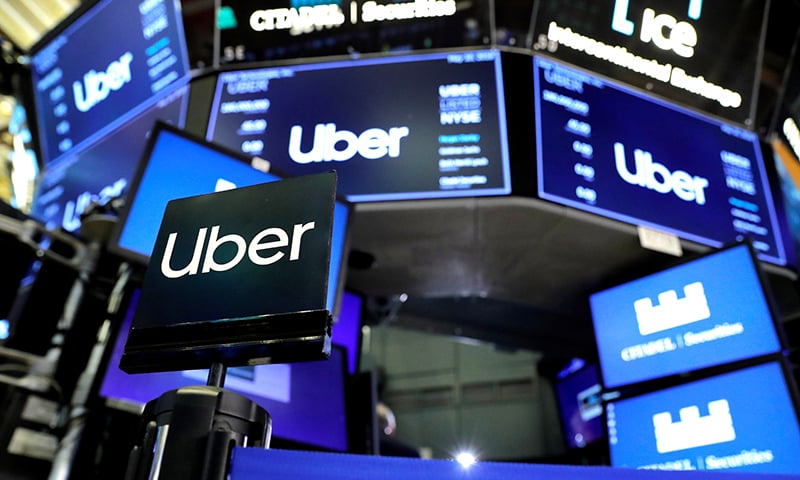Uber made its Wall Street debut on Friday, starting with an eye-popping $82 billion valuation in a milestone for the ride-hailing industry amid lingering doubts about its business model.
Chief executive Dara Khosrowshahi and an Uber team rang the opening bell on the New York Stock Exchange after the global ride-hailing giant raised some $8.1 billion in its initial public offering (IPO) that was among the largest ever for a tech company.
Despite the staggering valuation, Uber dialled back some of its earlier ambitions for a value exceeding $100 billion after a rocky start for US rideshare rival Lyft, which went public in March.
While Uber has lost billions of dollars since launching its first rides in 2011 in San Francisco, the company is aiming to develop a global brand that helps transform local transportation and eliminates the need for individual car ownership.
Whether Uber can drive to profitability using this model as it disrupts traditional taxi and transport services is a key question.
“For the ride-sharing companies, their IPOs are only the beginning,” said Matt Kennedy, a strategist at Renaissance Capital.
“They now enter public markets with billions in cash and a plan to conquer global transportation while managing to become profitable.”
Kennedy added that Uber faces “a lot of risks” but that its pricing is less aggressive than that of Lyft.
Daniel Ives at Wedbush Securities was upbeat on Uber despite the weaker-than-anticipated valuation.
“We view Uber's conservative pricing as a smart and prudent strategy coming out of the box as it clearly learned from its 'little brother' Lyft, and the experience it has gone through over the past month,” Ives said in a research note.
Ives said Uber has “established itself as the clear number one player in the ride-sharing industry and is paving a similar road to what Amazon did to transform retail/e-commerce and Facebook did for social media.”
Risks to new model
But some of the risks surrounding Uber and its rivals were highlighted on Wednesday as thousands of drivers turned off their apps in a United States-wide strike over pay and working conditions.
The strikes targeting Uber and its US rival Lyft highlighted a dilemma for ride-share firms, which have faced challenges from regulators and traditional taxi operators for using a business model relying on independent contractors.
One group protested outside the New York Stock Exchange, some holding signs that read “Invest in our lives — Not their stocks".
"While we aim to provide an earnings opportunity comparable to that available in retail, wholesale, or restaurant services or other similar work, we continue to experience dissatisfaction with our platform from a significant number of drivers," Uber said in a filing with securities regulators.
Uber said in a securities filing on Thursday that it had reached agreement with a large majority of the roughly 60,000 drivers contesting their status as independent contractors and who had instituted arbitration proceedings against the firm.
The company anticipates the total cost of the individual settlements, combined with attorneys' fees, will fall between $146 million and $170 million.
Uber maintained it was sticking to its plans on how it classifies drivers.
“Our business would be adversely affected if drivers were classified as employees instead of independent contractors,” the company said.
Uber's IPO was underwritten by Goldman Sachs, Morgan Stanley and Bank of America Merrill Lynch and other large banks.
Lyft shares skid
Uber's inauguration as a public company will follow a rocky market debut for Lyft, which has lost more than 15 per cent of its value since its March offering.
Lyft's losses in the past quarter widened to $1.1 billion, according to its first financial report as a public company.
Uber envisions becoming the “Amazon of transportation” in a future where people share instead of owning vehicles.
If all goes to plan, commuters could ride an e-scooter to a transit station, take a train, then grab an e-bike or e-scooter to complete a journey using the Uber smartphone app.
Uber is also taking to the sky with an Elevate project to have electric aircraft carry people between “skyports,” taking off and landing vertically.














































